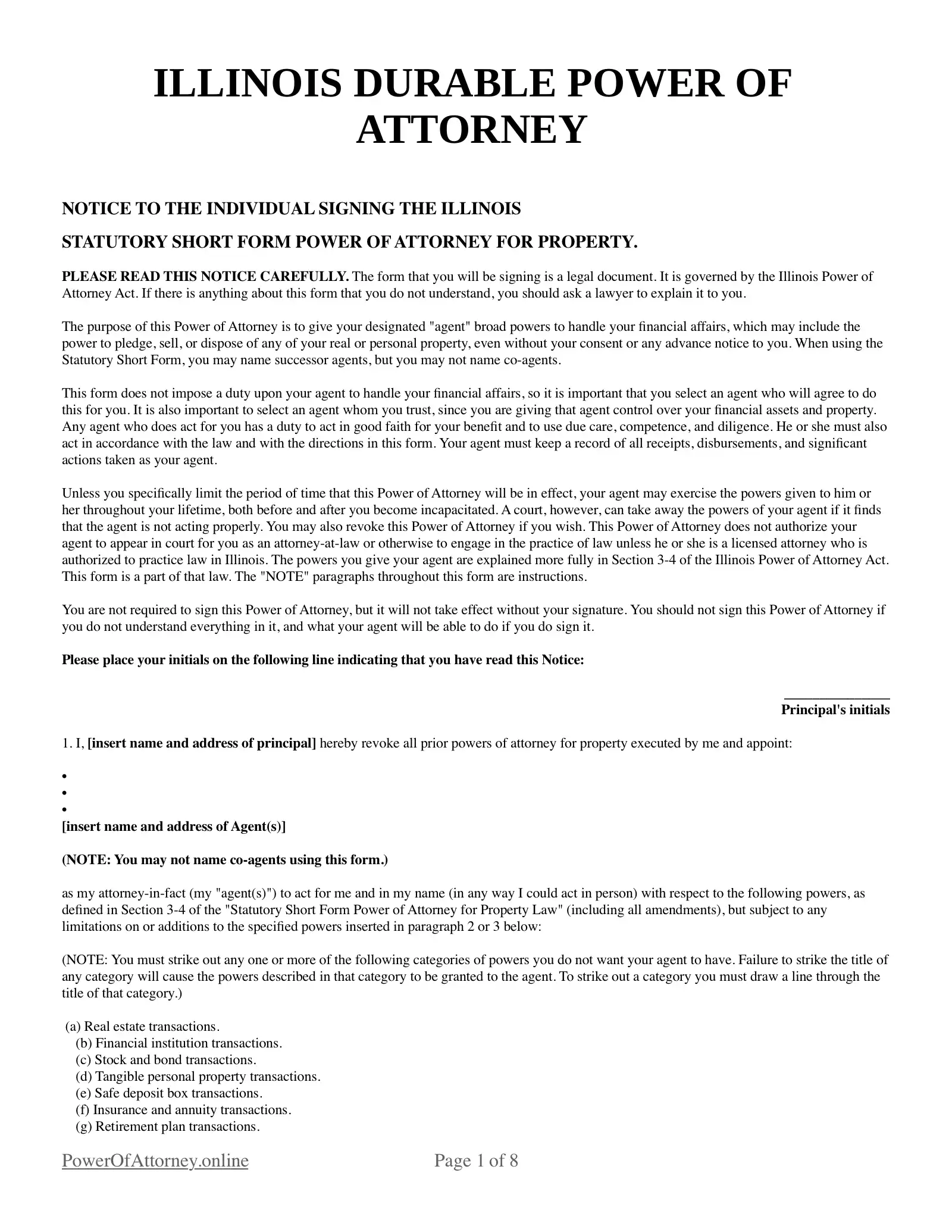Free Illinois Power of Attorney Forms
There are times when you need assistance handling financial and healthcare matters, which is why it’s wise to authorize someone you trust to make decisions on your behalf. You’ll need a power of attorney (POA) to make that happen.
A POA is written permission that empowers a person, referred to as an agent, to take care of important legal, financial, or healthcare decisions on behalf of another individual, known as the principal. The document is necessary in case the principal is either unavailable to sign documents or has become incapacitated. This way, the principal’s legal affairs can be kept in order.

Illinois Power of Attorney By Type
There is an appropriate POA for various situations. The key is knowing the different types and their functions, so you know which POA you need. The following are the types of Illinois power of attorney and their purposes.
- General Power of Attorney - This is the most common type of POA. It grants the agent all-encompassing power to take over the principal’s tasks and responsibilities. However, the power or authority ends when the principal becomes incapacitated or incompetent to the point that they are unable to make sound decisions for themselves or when the principal dies.
- Medical Power of Attorney - This form allows the agent to make healthcare decisions on behalf of the principal. Unlike the general POA, this document is necessary when the principal becomes incapacitated because it mostly pertains to medical treatments and procedures.
- Durable Power of Attorney - Like the medical power of attorney, a durable power of attorney is necessary when the principal is incapacitated but can additionally be used for actions outside of healthcare decisions, such as those regarding property or financial matters or whatever is specified in the document.
- Limited Power of Attorney - As the name suggests, this type of POA grants limited power to the agent, who acts on behalf of the principal, for specific tasks and within a limited period. It’s usually used when there is a document that needs to be signed, but the principal is not around to do so.
- Springing Power of Attorney - This is a cross between a limited POA and a durable POA because the agent’s authority takes effect when the principal becomes incapacitated or is unable to make sound decisions.
How To Get a Power of Attorney in Illinois
The most convenient way to get a power of attorney in Illinois is to download a printable template. The form has all the necessary components for an Illinois POA with spaces so the principal can provide specific instructions about what should be covered under the authorization.
The document must be signed in front of a notary public and at least one witness. The notary public and agent cannot be witnesses. Also, the principal’s parents, siblings, grandchildren, and their spouses, as well as the principal’s doctor, mental health service provider, and the owner or operator of their healthcare facility, are ineligible to stand as witnesses.
Illinois Power of Attorney Laws
The Illinois Power of Attorney Act recognizes that each individual has the right to appoint an agent who will be responsible for making financial, healthcare, and personal decisions that directly affect the principal within legal bounds.
It clarifies: “Nothing in this Act shall be deemed to authorize or encourage euthanasia, suicide or any action or course of action that violates the criminal law of this State or the United States” (755 ILCS 45/2-1).
The same law refers to the Illinois durable power of attorney as the agency, which governs the relationship between the principal and agent. The principal has the right to choose when the agency will begin and end. They can also dictate the rights, duties, and limitations bestowed on the agent and other entities that will deal with the agent.
The agent is required to keep the receipts and records of disbursements as well as other related financial actions made with the permission rendered by the POA. The records should be available when requested by the following: the principal or guardian acting on behalf of the principal, the Office of the State Long-Term Care Ombudsman during an investigation, and the Department of Human Services when acting on a complaint for financial exploitation (755 ILCS 45/2-7).
FAQs About Illinois Power of Attorney Forms
Some people may have questions about certain aspects of the Illinois power of attorney, including specific queries about their costs and how they are signed. Here is a collection of the most frequently asked questions and their answers for your convenience: